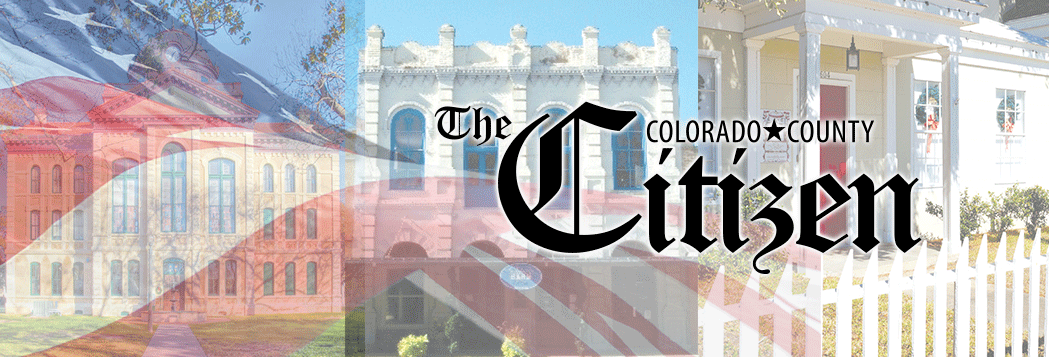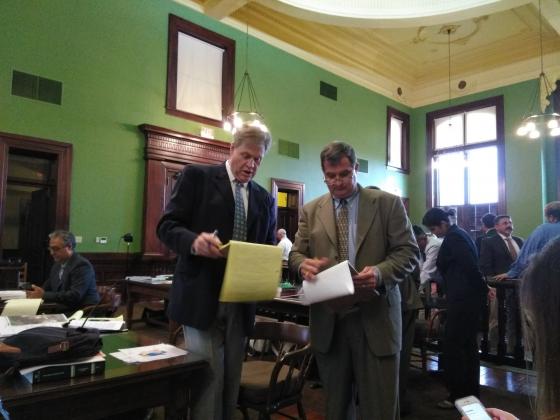TCEQ could still grant Clean Harbors permit
AUSTIN—Although a pair of administrative law judges recommended the Texas Commission on Environmental Quality deny a permit application for a hazardous waste landfill near Altair early last Wednesday morning, attorneys representing the county, Rice Consolidated ISD, and the local groundwater conservation in the litigation say the TCEQ could still grant the permit, attorneys for the county said Monday morning.
Kelly Brown, the attorney representing the county and other local entities challenging the permits, (called “aligned protestants,” in the legal parlance of Texas administrative law), said Monday that the TCEQ commissioners could do one of three things: agree with the administrative law judge’s recommendation and deny the permit, grant the permit, or grant the permit with conditions.
If the permit is granted or granted with conditions, the aligned protestants would have then have to file an appeal in state district court in Travis County to challenge the ruling. That could then be appealed to an intermediate appellate court, and ultimately to the Texas Supreme Court, although Brown said the supreme court’s review in such cases is discretionary, and they do not have to take up the case for review.
Brown said that, if a decision from TCEQ was appealed to state district court, evidence from the contested case hearing would be considered, and that the proceedings were closed to new evidence.
Recommendation from
ALJ’s
The judges’ recommendation, buried toward the end of the 172-page Proposal for Decision released by the two judges from the State Office of Administrative Hearings, includes findings that Altair Disposal Services/ Clean Harbors, the companies seeking the permit, failed to prove that the base of the proposed containment structure of the landfill would be separated from the underlying aquifer by at least ten feet of soil with specific characteristics required by state law, and that the proposed Altair site fails to qualify as a non-commercial hazardous waste disposal site.
Colorado County, the Colorado County Groundwater Conservation District, Rice Consolidated ISD, and Alliance for a Clean Environment (ACE), the aligned protestants, challenged Altair’s permit application in 2017, along with Todd Barten, a local investor and owner of Darmor Investments who owned property near the proposed landfill site.
Last Wednesday’s ruling is a source of relief for many in the Altair and Garwood areas, which are currently grappling with ongoing contamination at Skull Creek in the area.
The proposal for decision now must go before the Texas Commission on Environmental Quality. The agency will then determine whether or not to accept the ruling of the administrative law judges, or to challenge it and proceed with permitting.
Key findings
The judges found against Altair Disposal Services/Clean Harbors on each of the major issues the aligned protestants raised throughout the contested case hearing process, including that Altair Disposal Services’ application didn’t meet the standards to be considered non-commercial, that the water table was too close to the ground near the location of the facility, and that proposed lining mechanisms for waste pits proposed by Altair were not substantial enough to prevent discharge of contaminants in to the water table.
Meitra Farhadi and Pratibha Shenay, the two administrative law judges who have heard the contested case application since last March, wrote, “the ALJs find that the Altair Facility will accept waste for a charge and will not meet either exception in being considered a commercial facility.”
Under Texas law, in order for an application to operate a hazardous waste landfill to be considered “non-commercial,” it must either accept waste at no charge, or only accept waste from entities it owns or otherwise corporately controls.
The judges also found that the proposed landfill site would not be separated by the underlying aquifer by a minimum of ten feet of soil meeting specific characteristics required by state law.
The judges also found that the permit application failed to show that Clean Harbors/Altair Disposal Services “will reasonably minimize possible contamination of surface water and goundwater,” as mandated by state regulations.
They also wrote, in their conclusions of law, that Altair Disposal Services “did not prove by a preponderance of the evidence that waste expected to be disposed at the landfill is adequately characterized as required by [state regulations] and that the landfill will have on-site capacity to analyze waste,” in accordance with state regulations.
Background
Altair Disposal Services filed its initial application for a permit to locate a hazardous waste disposal adjacent to its existing site near Altair on Oct. 22, 2013.
The Texas Commission on Environmental Quality issued a draft permit on Jan. 20, 2016. The application was sent to the State Office of Administrative Hearings on Jan. 9, 2018 at the request of Altair Disposal Services for a contested case hearing.
A preliminary hearing was conducted in Columbus last March 28, and the full contested case hearing was conducted in mid-December of last year.
Final filings before administrative law judges were due in March.
Not first time
This attempt by Altair Disposal Services to gain a permit for a hazardous waste landfill wasn’t the first attempt to do so.
When Laidlaw/Tricil Environmental owned the facility, they announced similar plans in 1991. That resulted in various litigation. In August, 1992, a state district judge stopped Laidlaw/Tricil from continuing construction on a hazardous waste permit pending related litigation against the Texas Water Commission.
On June 27, 1997, the Texas Natural Resource Conservation Commission (TNRCC), forerunner of the TCEQ, rejected Ladlaw’s permit application as defiient.
On July 16, 1996, Laidlaw was again informed by TNRCC that their revised application was deficient.
On January 27, 1998, Laidlaw announced it would withdraw its application for a hazardous waste facility and would likely close its Altair solid waste facility within 15-16 months.
Altair Disposal Services filed its initial application for a permit to locate a hazardous waste disposal adjacent to its existing site near Altair on Oct. 22, 2013.
The Texas Commission on Environmental Quality issued a draft permit on Jan. 20, 2016. The application was sent to the State Office of Administrative Hearings on Jan. 9, 2018 at the request of Altair Disposal Services for a contested case hearing.
A preliminary hearing was conducted in Columbus last March 28, and the full contested case hearing was conducted in mid-December of last year.

